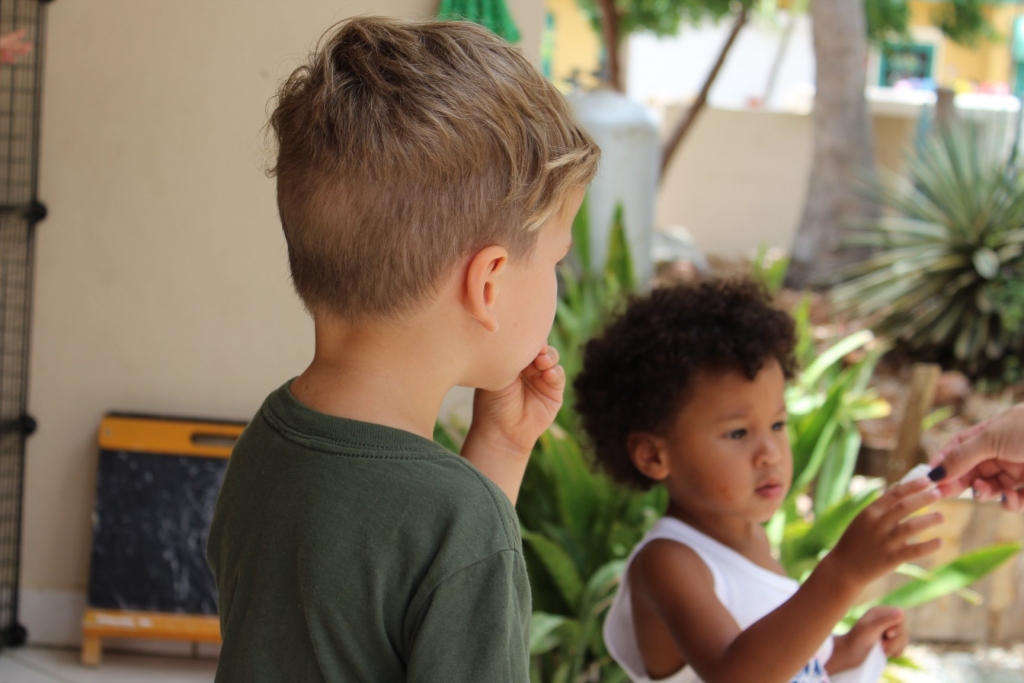2 to 4 year old Program
Our 2 to 4 year old program
The child, who can now walk and feels confident of his strength, begins to notice the actions of those about him, and tries to do the same things. In this period, he imitates not because someone has told him to do so, but because of a deep inner need which he feels.

The Program
Language Development Between the ages of one and four, a child will go from speaking two-word phrases all the way to full sentences, using correct grammar. To reduce the typical frustration that children feel when they don’t yet have the skill to share their needs and preferences, it’s important to support your child’s early language development, deliberately and methodically exposing your child to the specific language that she will need on a daily basis. This aspect of language learning is an important part of your child’s classroom experience.
In our Montessori classrooms, a child is exposed to real, rich, precise, and varied vocabulary and grammar. The Montessori guide will get down on the child’s level, look in his eyes, and speak to him clearly, so that he can watch the movements made by her mouth as she speaks. Children will enjoy carefully chosen songs, and read-aloud books with poetry, real stories and beautiful illustrations.
Your child will experience less frustration as he learns to express his ideas and feelings in words, and this thoughtful approach to language will also prepare him for later reading and writing.
Confidence and “Practical Life” Toddlers love to do real-world, adult tasks “all by myself”! Nature House offers your child real tools and opportunities through the Montessori “practical life” activities.
In this right-sized environment, the Montessori practical life exercises allow a child to perform real-world, purposeful tasks that your child can choose and complete independently. Your child will become an important contributor to her community, and practice tasks over and over to achieve mastery, building confidence and self-esteem. This gives rise to a naturally self-reinforcing process: the more he tries, the more he succeeds. The more success he feels, the more confident he becomes. The sense of accomplishment that a child feels each time he achieves something new (something that grown-ups do, too!) builds the foundation of self-confidence that he will carry with him throughout his life.
Coordinated Movement & Problem-Solving In our Montessori classroom, children have access to increasingly-sophisticated Montessori activities. Each activity is matched to the appropriate moment in an individual child’s development and designed to strengthen the integration between her mind and her hand. These activities support the children in learning to understand cause and effect, solve problems, make choices, and pursue goals, as well as giving her plenty of opportunities to practice increasingly coordinated movements.
Some activities feed a child’s developing mind through hand-eye coordination; others address his need to move and grow. Your child will engage in gross motor activity, both indoors and out, from singing and dancing with friends, to climbing and riding bicycles on our beautiful playground, to simply experiencing the joy of freedom of movement in the Montessori classroom.
Toilet Independence One of the most important ways a toddler learns to be independent is in learning to use the toilet on his own. Our Montessori guides know how to watch for the signs that a child is ready, and how to motivate him to learn without pressure.
Your child will have access to the bathroom and we’ll share comfortable rhythms and routines that make using the toilet familiar and appealing. Most of all, the mixed-age classroom is an invaluable resource: older children in the class will be setting the example, inspiring interest and a desire to emulate in the younger children. The Montessori approach ensures that great care is taken to keep the experience positive and relaxed.
Socializing with “Grace and Courtesy” One of the most exciting things about working with this age group is watching them begin to interact, play, and socialize with their peers. To learn, children imitate the adults around them, establishing patterns of social behavior that will stay with them throughout their lifetimes. Because children move freely in their Montessori classroom, they have lots of opportunities to interact with other children.
Our Montessori guides help children learn positive social interaction through specific lessons in “grace and courtesy.” Rather than constantly correcting your child’s behavior from a negative perspective, children are instead shown what to do in each situation. Courteous interactions are modeled, capitalizing on the children’s delight in imitation. Lessons in grace and courtesy help your child to navigate his world with confidence and consideration for others.



